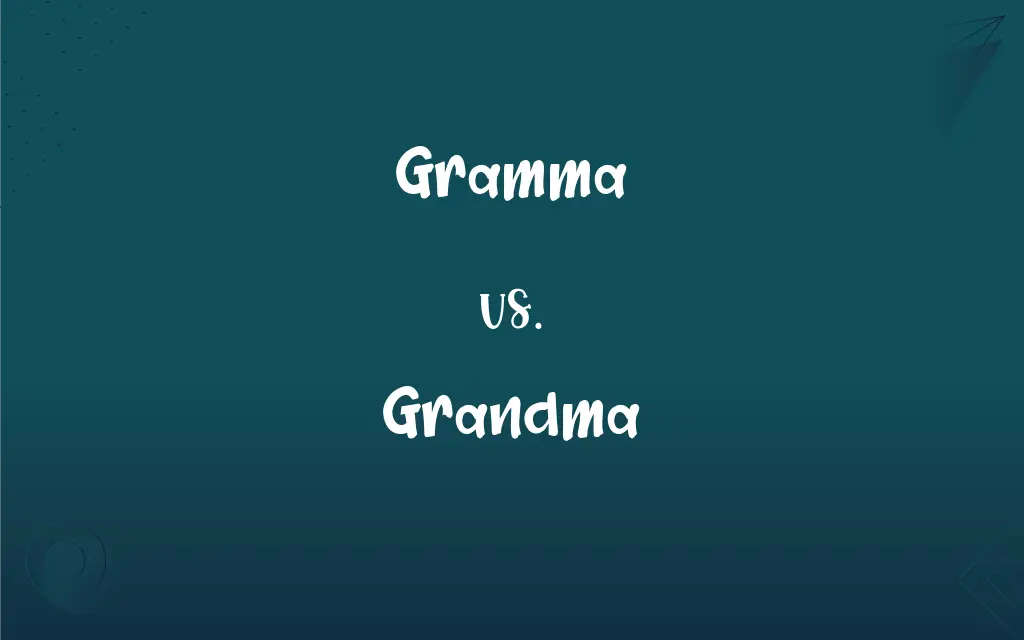Gramma vs. Grandma: What's the Difference?
By Janet White & Harlon Moss || Updated on May 20, 2024
Gramma is an informal, affectionate term for grandmother, often used in casual speech or writing, while grandma is a more common and widely recognized term for grandmother.

Key Differences
Gramma is a colloquial variation of the word grandmother, typically used in informal settings and often reflective of regional dialects or family traditions. It conveys a sense of warmth and familiarity and may be used by younger children or in casual conversation. Grandma, on the other hand, is a widely accepted and standard term for grandmother. It is more commonly used in both formal and informal contexts and is easily recognizable across different regions and cultures.
Gramma might be seen more in personal notes, family gatherings, and spoken language, reflecting a closer, more personal relationship. It can be specific to particular families or regions, where certain terms of endearment are preferred. Grandma, however, is universally understood and is frequently used in broader contexts, such as in literature, media, and formal introductions.
Both terms indicate a grandmother, but the choice between "gramma" and "grandma" can depend on personal preference, cultural background, and the level of formality required. While "gramma" might carry a more intimate or informal connotation, "grandma" is versatile and widely recognized.
Comparison Chart
Definition
Informal, affectionate term for grandmother
Common, standard term for grandmother
Usage Context
Informal, casual, family-specific
Both formal and informal
ADVERTISEMENT
Recognition
Less widely recognized
Universally understood
Connotation
More intimate and personal
Balanced affection and formality
Variants
Can vary regionally or personally
Consistently recognized term
Gramma and Grandma Definitions
Gramma
Used in casual or intimate settings.
Gramma always bakes the best cookies.
Grandma
Common term for grandmother.
Grandma is coming to visit for the holidays.
ADVERTISEMENT
Gramma
Reflective of family or regional dialects.
My gramma has a lovely garden.
Grandma
Suitable for both formal and informal use.
My grandma lives in Florida.
Gramma
Conveys warmth and familiarity.
I love listening to gramma's stories.
Grandma
Balances affection with formality.
Grandma taught me how to knit.
Gramma
Often used by young children.
Gramma read me a bedtime story.
Grandma
Widely recognized and understood.
We called grandma to wish her a happy birthday.
Gramma
Informal term for grandmother.
We visited gramma every summer.
Grandma
Used across different cultures and regions.
Grandma always gives the best advice.
Gramma
A grandmother.
Grandma
A grandmother.
Gramma
Variant of grama.
Grandma
(informal) grandmother
Gramma
Any of various grasses of the genus Bouteloua of western North America and South America, forming dense tufts or mats and often used as pasturage.
Grandma
A grandmother.
Gramma
A pasture grass of the plains of South America and western North America; same as grama grass, which see.
Grandma
The mother of your father or mother
Gramma
Pasture grass of plains of South America and western North America
FAQs
What does grandma mean?
Grandma is a common, standard term for grandmother, suitable for both formal and informal use.
Is gramma widely recognized?
Gramma is less widely recognized and is more specific to families or regions.
Is grandma universally understood?
Yes, grandma is universally understood and used across different cultures and regions.
What does gramma mean?
Gramma is an informal, affectionate term for grandmother, often used in casual or intimate settings.
Where is grandma typically used?
Grandma is used in conversations, written communication, and public references.
Can gramma have regional variations?
Yes, the spelling and use of gramma can vary regionally or personally.
Where is gramma typically used?
Gramma is typically used in personal notes, family gatherings, and spoken language.
Is grandma consistent in its use?
Yes, grandma is consistently recognized and used across various contexts.
Which term is more formal?
Grandma is more versatile and can be used in both formal and informal contexts.
Which term conveys more intimacy?
Gramma conveys a more intimate and personal connotation.
Is gramma used in literature and media?
Gramma is less commonly used in literature and media compared to grandma.
Can grandma be used in formal introductions?
Yes, grandma is suitable for formal introductions and public references.
Is gramma more common in spoken language?
Yes, gramma is more common in spoken language and informal settings.
Which term balances affection and formality better?
Grandma balances affection and formality, making it versatile for various contexts.
Is gramma specific to certain families?
Yes, gramma can be specific to certain families or regions where it is a preferred term of endearment.
Which term might children prefer?
Children often prefer the term gramma due to its informal and affectionate nature.
Is grandma commonly used in public announcements?
Yes, grandma is commonly used in public announcements and formal communication.
Which term is more likely to appear in a child's drawing or card?
Gramma is more likely to appear in a child's drawing or card due to its affectionate and informal nature.
Does grandma have any specific cultural connotations?
Grandma is widely used without specific cultural connotations, making it universally accepted.
Can gramma be considered slang?
Gramma can be considered a colloquial or slang term for grandmother.
About Author
Written by
Janet WhiteJanet White has been an esteemed writer and blogger for Difference Wiki. Holding a Master's degree in Science and Medical Journalism from the prestigious Boston University, she has consistently demonstrated her expertise and passion for her field. When she's not immersed in her work, Janet relishes her time exercising, delving into a good book, and cherishing moments with friends and family.
Co-written by
Harlon MossHarlon is a seasoned quality moderator and accomplished content writer for Difference Wiki. An alumnus of the prestigious University of California, he earned his degree in Computer Science. Leveraging his academic background, Harlon brings a meticulous and informed perspective to his work, ensuring content accuracy and excellence.































































